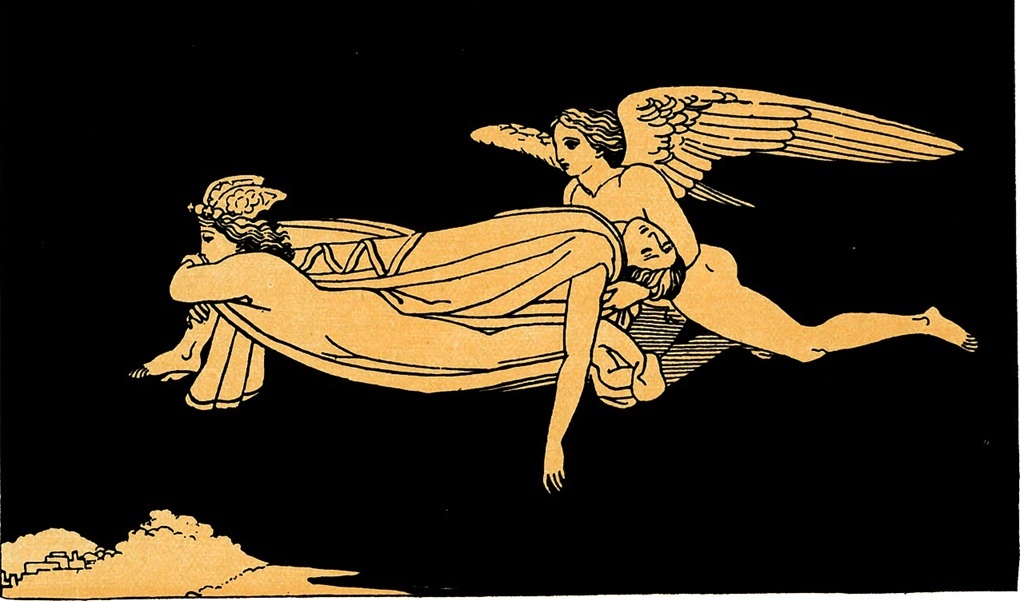.
Hypnos
Wraiths of twilight-conjured mist:
At last, a prospect of release.
Come child, keep our nightly tryst.
To you, the wakeful weariest,
_I bring unconscious peace.
Steal softly past your unlaid ghosts,
Ignore the creaking of your stair,
Embrace the nightmares you dread most;
Your time has come to know the worst.
_Surrender, and prepare.
Rehearse the epilogue of day,
Snuff the candle, dowse the light.
Let me bear your thoughts away,
Let your abandoned psyche stray
_Where truth dissolves in night.
Believe you rule those wanton deeps,
But sovereignty comes at a cost.
Beside your bed, while shadows creep,
My arch twin brother never sleeps.
_You’ll meet him: Thanatos.
.
.
Helios
You’ve travelled far and widely while you slept,
inhabited some dark disturbing dreams.
Now, refugee from otherness, you’ve stepped
into the hour when Helios redeems
the innocence of shadow from the dark.
The amnesty of reason has begun.
A star is nothing but a dying spark
struck from oblivion by the very sun
now probing all those dreadful holes and corners.
Each is empty. Wake to lambent light,
revel in the greenwood’s dawning chorus:
birds never heard of such a thing as night.
.
.
Martin Briggs lives in Suffolk, England. He only began writing in earnest after retiring from a career in public administration, since when he has been published in various publications on both sides of the Atlantic.















Those are two wildly enchanting and entertaining poems from different perspectives regarding sleep. You prove to have an adept and creative mind that conjures up imaginative images.
Thank you Roy.
This is a sophisticated pair of poems, almost like Milton’s “L’Allegro” and “Il Penseroso.” It’s interesting that the first poem has the title “Hypnos” (sleep), and is clearly in the voice of sleep speaking to a child. “Thanatos” (death) is mentioned at the finish of the poem, as if that name closed the circle. This would be a common trope in Western poetry, where “The sleeping and the dead are but as pictures” (Shakespeare), and where sleep and death are considered as complementary, or as parallels.
But the second poem is about “Helios” (the sun), and concerns awakening from sleep. The speaker is unknown, or might simply be the authorial voice. It celebrates light, morning, waking, brightness. What we have here is an escape from sleep and from death, with a strong rhetorical push against both of them. Consider the language:
“dark disturbing dreams”
“refugee from otherness”
“dreadful holes and corners”
“Helios redeems”
“Wake to lambent light”
“revel in the dawning… chorus”
Strongest of all are the lines “The amnesty of reason has begun” and “birds never heard of such a thing as night.” These two lines are jam-packed with meaning: the first is a powerful metaphor of the conscious human mind’s release from the dark obscurity of the unconscious, and the renewed freedom that rationality gives us; the second uses the flight of birds to describe, figuratively, the human release from earthbound, dark, nocturnal, mortal chains. Helios — the god of light, civilization, order, reason, consciousness, art, and achievement — is here expressing his triumph over the sleep and death of the first poem.
The waking sleeper is a “refugee from otherness.” What an image! He has escaped from the dark pit of that which is NOT himself, and come at last into the bright light of his real birthright. Is that not what we in the West have before us as an urgent task? We must slough off the sick worship of “The Other” and “The Alien,” and awaken to the bright light of of Western cultural identity.
Thank you for this detailed critique, Joseph. I’m pleased that you picked up the sleep-death ambiguity – a recurrent theme of W Shakespeare, as you point out (For in that sleep of death what dreams may come” etc etc). As for “the bright light of Western cultural identity”, I’m continually surprised by the way a reader can derive more from a piece than the writer put into it! But I suppose anything that stimulates individual reflection is for the good, even if tangential to the ostensible subject matter…. Kind regards.
These are both fascinating and beautifully written descriptions of things that are hard to describe. One thing I love about “Hypnos” is your stanza form, composed of four lines of tetrameter, followed by a fifth line of trimeter — the trimeter line seems to add an emphasis that strengthens the mood by drawing the reader up short (especially “You’ll meet him: Thanatos”). After that one, there’s a nice sense of relief in “Helios” — I feel like a “refugee from otherness.” I think the last line of each of the two stanzas is particularly insightful.
Thank you Cynthia. Yes, these two pieces were meant to complement each other, so I’m glad they struck you that way.
I can relate to both poems, Martin. Some great imagery here.
What a fantastic couple of lines: ‘the hour when Helios redeems / the innocence of shadow from the dark’.
Thanks for the reads.
And thank you, Paul, for reading them.
What a treat it is to read this exquisite and highly entertaining pair of contrasting and complementary poems. Dr. Salemi’s enlightening comment has given me further appreciation. I particularly enjoyed: “Let your abandoned psyche stray / Where truth dissolves in night” – magical, mysterious, and… dangerous. Martin, thank you!
Thank you Susan. I’ve never been called dangerous before….
For me, the trimeter lines of “Hypnos” give you pause to contemplate the preceding tetrameter lines.
Two of the most under-used words in the English language are “hypnogogic” and “hypnopompic.” Without using those words, Martin has covered (or uncovered) the substance of their denotation.
Thank you, C.B. I’ll take your word for it….